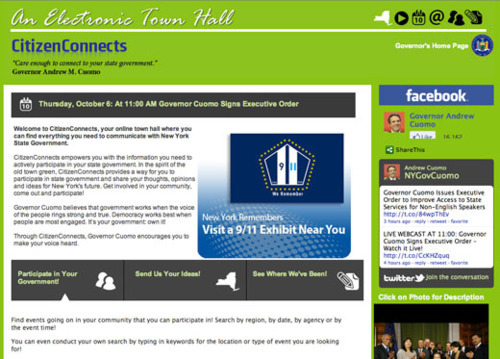
Last month the Cuomo administration debuted Citizen Connects, a website that “empowers you with the information you need to actively participate in your state government.” It includes schedules for the governor, chats with agency commissioners and listings of upcoming hearings of state agencies.
But since June, a bill that would put greater substance behind his inauguration speech promise that his administration would promote “real transparency and real disclosure and real accountability” has been tied up in Albany, at the end of a long line of measures awaiting the governor’s signature.
The bill, A00072, would require agencies to publish electronically all pertinent documents scheduled to be discussed at public meetings before the meeting occurs, if the agency has an active website and a broadband connection. If not, physical copies must be made available at the meeting. The bill passed the state Assembly and Senate this summer.
As it stands now, such documents are often only available to the public days after a meeting finishes. Citizens who want to be involved in the political process or journalists often arrive at meetings without access to the essential information needed to understand the proceedings, even though these are “open meetings.”
“This should really be in the no-brainer category,” said Russ Haven, legislative counsel at the New York Public Interest Research Group. “It happens at the local government level too often that you can’t get an agenda or the legislation or the proposals that are being considered and it’s extremely frustrating.”
This bill represents an important victory for open government advocates in New York. It stems from a proposal by the state Committee on Open Government, a division of the New York Department of State that advises government agencies and the public on obligations to disclose information about government activities.
Under Assembly rules, the bill should have been sent to the governor already. After an Assembly bill passes both houses, the offices of the governor and the Assembly speaker work together to prioritize which bills are transmitted when. Usually, a bill must be transmitted within 45 days of its passage. But when the last legislative session ended in June, and hundreds of bills awaited transmittal to the governor, Assembly Speaker Sheldon Silver (D-64) decided to extend the deadline to allow the governor more time to review each of the bills, according to the speaker’s press secretary, Michael Whyland. Legislative leaders and the governor’s office put bill A00072 at the bottom of this hundreds-long list. It now sits with roughly the last 30 bills waiting to be sent, 107 days after its passage of both houses.
Governor Cuomo’s office told The New York World that it had no comment on the pending legislation.
Assemblywoman Amy Paulin of Westchester (D-88), who sponsored the bill, expects it to be transmitted soon. Rules dictate that the bill be sent with the next back in the next two weeks or in December when, by law, all bills must be sent.
Paulin says that the motivation for the bill came from her days as an advocate when meeting reports and records were withheld from her on purpose. The bill, she says “is important to ensure the integrity of local government and local school districts so people have a voice.”
The committee’s original recommendation included a requirement to release documents at least 24 hours in advance but the current version does not include a time frame. And while the Committee’s latest report “applauds the efforts” of Assemblywoman Paulin it adds that the amended bill’s language “offers unnecessary discretion to agencies and their duty to make records available to the public in a meaningful manner.” Bob Freeman, the committee’s executive director, says the amended form of the bill was the result of inevitable political compromise to ease a perceived burden on agencies.
This type of disclosure will in fact reduce the burden on agencies, Freeman maintains, because proactively disclosing information reduces the volume of time-consuming Freedom of Information Law requests an agency receives. Freeman adds, that the bill as passed will nevertheless still make a big difference for transparency and citizen involvement and that he is pleased to see it on track to becoming law.
The Committee made 14 formal recommendations for open government legislations in 2010, and Paulin says she pays close attention. “I try to get at least one passed every year,” she says.









